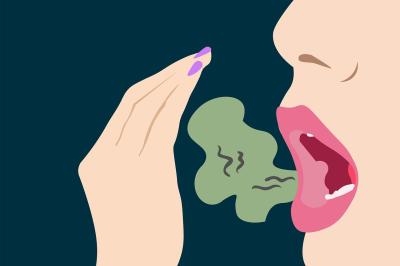Bad breath (also known as halitosis) can harm self-confidence. Even with a good oral hygiene regimen, symptoms can still develop — but why is this the case? Why can one still have bad breath even after a thorough brushing?
Causes of Bad Breath
You might now be asking the question: "Why does my breath smell bad even after brushing?" The answer lies in the fact that bad breath is not necessarily caused by poor oral health. While it is true that brushing can remove the bacteria that lead to halitosis, many other factors may be contributing to the condition.
Certain Foods
Depending on your diet, there are some foods out there which may lead to bad breath. Strongly flavored foods (i.e. onion) tend to linger much longer than others, resulting in bad breath even after brushing — particularly garlic, which can remain on one's breath for an entire day or more.
To help counteract the smell, you might try consuming fresh foods like mint leaves, apples, or raw lettuce leaves.
Dry Mouth
Saliva is far more important to your oral health than you might think. Besides aiding in digestion, it allows the mouth to have healthy moisture while flushing out leftover food particles. A dry mouth occurs when there is insufficient saliva production of the salivary glands, which can in turn let bacteria accumulate on the teeth or gums. The result is bad breath, all while increasing your overall risk of gum disease and tooth decay.
Dry mouth can be caused by any number of conditions, including but not limited to drug use, tobacco use, or alcohol. To combat its effects, consider implementing oral spray, increasing your water intake, or getting a consultation for a saliva substitute.
Cavities and Gum Disease
Aside from their obvious effects on tooth health, cavities present an opportunity for odorous bacteria to hide within them. What's worse, these bacteria often reside in areas that are harder for a toothbrush to reach — even in the gums, which can later develop gum disease.
Utilizing fluoride products and practicing proper oral hygiene are great ways to build protection against cavities. For teeth that are more severely damaged, you may want to consult your dentist to discuss other treatment options (i.e. fillings, crowns, or extractions).
Smoking
Unfortunately, the smoke from tobacco can easily remain on your breath, heavily contributing to bad breath even after a thorough brushing. Smoking has also been linked to cases of dry mouth, which boosts conditions conducive to bacteria growth — and puts you more at risk for gum disease.
While quitting a smoking habit is never easy, there are a few techniques you could begin with. For example, you may try nicotine replacement therapy, engage in additional physical activity, or join a support group.
Postnasal Drip
Postnasal drip occurs when your sinuses become irritated, causing mucus to drip into your throat from the very back of the nose. This increase in mucus production opens the door for bacteria to grow, which in turn leads to foul-smelling breath. Postnasal drip is commonly a result of sinus infections, the flu, colds, or strep throat.
The best plan would be to identify the illness you currently have and seek out proper treatment, whether that means a dose of cold medicine, a decongestant, or simply lots of rest.
Gastroesophageal Reflux Disease (GERD)
Gastroesophageal reflux disease (also known as GERD) is defined as a gastrointestinal system disorder that results in stomach contents moving back up into the esophagus. The combination of undigested food and stomach acid will most definitely cause bouts of bad breath. If you are experiencing heartburn or an off-putting aftertaste, you might have GERD.
Treatments for this condition range from lifestyle changes (i.e. losing weight or changing your diet) to over-the-counter medications, such as antacids.
Underlying Health Conditions
There is always a chance you may have underlying medical problems that contribute to bad breath despite frequent brushing. Fluctuations in your body's bacteria count or chemical changes in the bloodstream are common causes. Examples of conditions connected to bad breath include kidney or liver failure, intestinal blockage, ulcers, and diabetes.
Of course, treatment will depend on the medical condition you have. Be sure to seek out a medical professional's advice before trying any remedies yourself.
When Should I See a Dentist?
If you continually practice good oral hygiene and the problem persists, schedule an appointment as soon as possible with your dentist to determine what might be causing bad breath. More serious cases of dry mouth, gum disease, and other medical problems will most likely require medical intervention to cure halitosis permanently.
If the dentist is unable to identify any oral health issues, then the next step is to consult a physician to place the cause. Remember to carefully review any medications or lifestyle changes during your visit, as well.
Kneib Dentistry: A Breath of Fresh Air
Maintaining a healthy mouth doesn't have to stink! Schedule an appointment with us today!


